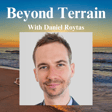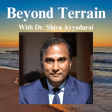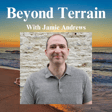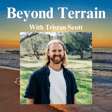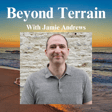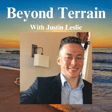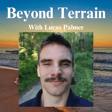Introduction to Podcast
00:00:01
beyondterrain
Hello, everybody. Welcome back to another episode of the Beyond Training Podcast. I'm your host, Liam Dalton. Today, we're going to have an amazing episode. I think we're going to talk about some really cool topics today. Uh, you know, just before the show started, the conversation was already so lively. So that's just, that's always a good sign of, uh, it's going to be a great episode.
Understanding Childhood Illness
00:00:19
beyondterrain
Today we have Dr. Lawrence Pilevsky on, uh, and I've certainly listened to quite a bit of his work and, um, especially early on in, in my, in my journey. And it was great. ah helping me understand sort of the, you know, a lot of the development of disease, especially in in childhood illness, you know, that's really where I find his work shines. Of course, he's a, he works with, with children primarily and he does residency in pediatrics. So um anyways, this is going to be a great discussion. Dr. Pilecki, thank you so much for coming on today.
00:00:51
Lawrence Palevsky MD
Oh, it's a pleasure, Liev. I look forward to our discussion.
Defining Health
00:00:55
beyondterrain
me too. Me too. So the first question I asked all my guests is, ah What is health? And this is sort of, what does health mean to you? How does it manifest? You can take it in any sort of direction, but it gives us a good foundation to work off of. So what what does health mean to you?
00:01:10
Lawrence Palevsky MD
so So health is something that's ah dynamic. It's not one thing, and it's never the same from moment to moment. Health is a state of existence that is impacted by many factors in our lives. So it believe it or not, it's impacted by information that we come into the world with through our ancestors. It's impacted by information we receive from our genetics. It's impacted by what we experience in utero. And then it's and impacted by the air we breathe, the things we put in our mouth, the things we put on our skin, the things we put inside the skin, and the things that we get into our nervous systems, the wavelengths, the frequencies, thoughts, ideas,
00:02:01
Lawrence Palevsky MD
ah um weight you know just just things that are happening in the world that are coming into our senses. And so our health is determined by our dynamic interaction with every part, body, mind and spirit of our lives. And then we have the environment and then we have people and then we have um ah things that are coming at us.
Symptoms as Indicators of Health
00:02:27
Lawrence Palevsky MD
And so health is the way in which our body is able to cope and manage
00:02:37
Lawrence Palevsky MD
keeping us alive in relation to the load of information that we give that we are given. And then of course, the most important piece of health is how well we're able to discern what comes into us, to utilize what we need, and to get rid of what we don't. And on any given day, that capacity is different. The load is different. And therefore, our response to the environment is going to be different. And I remember, you know in in medical school and residency,
00:03:14
Lawrence Palevsky MD
you know health is the absence of disease.
00:03:18
Lawrence Palevsky MD
And I remember, or health is the absence of symptoms. And over time, i I began to understand that symptoms are actually part of health. They're just a way in which the body tells you the load that you've been given and your capacity to remove the load of waste has changed. And the way it's changed is you've either gotten more than you can handle,
00:03:49
Lawrence Palevsky MD
you've gotten stuff that you were very sensitive to, or both, and the ways in which you get rid of the wastes were compromised.
00:03:59
Lawrence Palevsky MD
And so you had to have symptoms in order to bring you back to the state of health your body most craves, which is homeostasis. And so I began to learn that symptoms were actually part of health. And some in some ways, symptoms were the ways in which your body saves yourself from dying. And once I started realizing that in clinical practice, it changed the way I was able to help families. Now, certainly that paradigm, we're about 50 to 100 years behind that paradigm, but that doesn't mean we don't start it you somewhere.
00:04:37
Lawrence Palevsky MD
So again, it's a dynamic process. It's a relationship and it's impacted by many things that are conscious and subconscious. And the absence of symptoms is a certain level of health and the development of symptoms is another level of help health, but neither one is good nor bad. It's just something to understand and and engage in a relationship with.
00:05:07
beyondterrain
Yeah, very well, but absolutely. You know, I had, I was talking to, uh, Mr. Amherst Goldsworthy there and he would likely completely agree with what you said there. But you know, he was, he talked about, you know, when it comes to symptoms, having symptoms, like you were saying, is, is not a bad thing when it's the right symptom as the right response.
Toxins and Acute Illnesses
00:05:33
beyondterrain
Now, the absence of symptoms when you should have symptoms can be very problematic, right?
00:05:39
Lawrence Palevsky MD
Sure.
00:05:39
beyondterrain
Like if you have a bunch of toxins in your chest or in your your lungs, you know, and you're not coughing, that's not a good thing, right? Like getting these acute illnesses, you know, My understanding is that having these acute illnesses and these, you know, you can think of it as sort of detox or adaptation to the environment, as you were suggesting, sort of this dynamic interplay of what we're given and our body needs to adapt to that to reach this sort of homeostasis. You know, getting rid of that response leads this underlying disease state to become more ingrained in us. And my understanding is that it sort of leads to
00:06:22
beyondterrain
our chronic conditions because the disease must manifest eventually. And so cutting off this healing pathway when it's acute allows our bodies to really hang onto it deep inside of us.
00:06:34
Lawrence Palevsky MD
Correct.
00:06:35
beyondterrain
And it leads to these chronic conditions. I wonder if you have any comments on that.
00:06:37
Lawrence Palevsky MD
Well, yeah, I mean, I've been talking about this for over 20 years. So um I'm gonna put it in in ah clinical terms and and then and then say it in layman's terms.
00:06:51
Lawrence Palevsky MD
When we think of acute illness in our culture, The first thought that goes off in most people's heads is infection. Regardless, bacterial, viral, fungal, ah parasitic, every time you get sick, it's an infection. Oh, there's a virus going around. Oh, you know you caught what they caught, what they had. And so it becomes very difficult
00:07:25
Lawrence Palevsky MD
to navigate that situation when you begin to realize that the onset of an illness is rarely an infection. and And so herein lies the problem, because if you go to the place of the purpose of an illness, the cause of an illness is almost always an infection, then you're never going to be conscious of your lifestyle, your thought process, your environmental choices, your dietary choices, your relationship choices, your sleep choices, you're never gonna be conscious of it because nothing is gonna alter your way of life because you're gonna believe that something happened to you, you're a victim, ah you caught something. right But if you shift
00:08:19
Lawrence Palevsky MD
and start to understand that the onset of symptoms is in fact your body's attempt to save yourself from dying, then you might step back and say, oh wow, is there something I breathed in, something I ate, something I put on my skin, something I injected into my body, something I accepted into my nervous system, that was so egregious, so caustic to my body that the only way my body could stay alive was to purge it through an illness.
00:09:04
Lawrence Palevsky MD
And then you might step back and say, wow, you know, maybe I shouldn't eat that. Or maybe I need to get an air purifier. Or maybe I want to consider what I'm injecting into the body. Or maybe those skincare lotions and makeup and sunscreens might not be a great idea.
Holistic vs. Western Medicine
00:09:22
Lawrence Palevsky MD
And maybe these people who are caustic in my life and giving me all this nervous tension are ah They're not necessarily in my highest good. And then you stop thinking of yourself as a victim and you believe in yourself as more of ah of a sovereign being who actually has choice to, you know, I know this isn't good for me, so I'm not going to eat it.
00:09:51
Lawrence Palevsky MD
versus, I don't care if this isn't good for me, I like it, I'm gonna eat it, and nothing's gonna happen to me. And then you get sick and you're like, no, it wasn't from that. So we live in a culture where people are made to believe that nothing of their choices they need to be responsible for. And so we're all victims, we all catch something, And it's it's so interesting that diet and environmental medicine are not part of Western medical education at all. And yet, I mean, that's like saying the kind of fluid you put in a gas tank has no impact on whether or not that car is going to run or even turn on.
00:10:44
Lawrence Palevsky MD
And don't give me its electric, so I'll i'll slap you in the head. you know like No, it's just amazing the cognitive dissonance. So luckily more and more people are beginning to say, wait a second, I actually have sovereignty. I actually have agency. I actually have choice. I can change what I eat and change the way I feel. I can change the air I breathe and change the way I feel. I can change the material I put on my eight body and in my body and change the way I feel. I can alter my nervous system environment and change the way I feel. I can create different relationships, different thought patterns.
00:11:30
Lawrence Palevsky MD
and change the way I feel. And that is worrisome to the Western medical um monarchy you know because it it it makes people less and less dependent on a pill. And don't get me wrong. I have nothing against people who want the pill. That's fine. That's certainly their choice. That's their sovereignty. That's their freedom. That's their agency.
00:11:59
Lawrence Palevsky MD
But more and more, it is it is clear that if we're gonna be sovereign beings, if we're gonna be ah free, if we're gonna take our inner agency and and and resonate with it, and we're gonna have to be conscious of our choices and what is and to do and live and eat and drink and be in an environment where where we have accountability and responsibility for for our health.
00:12:35
beyondterrain
Yeah, the listeners are going to be saying, you know, uh, Lee, I've steals all of Dr. Falevsky's work because that's what I say all the time. Responsibility, you know, I don't care if you think germs cause disease or not. You're still playing the victim. If you think, Oh, this is just random, you know, it's just the victim mindset. That's the killer, you know? Um, and like you said, I think you make a good point there as well. Um, no, I got nothing against people who, who want the modern medicine, who want allopathy, you know, I got no problem with that. I do believe that, you know, they have a problem with with us practicing our ways. I would say that you could make a pretty decent case on that front. But, you know, I do believe in some sort of transparency as well and in science, especially. And I believe that science is largely, it's not transparent whatsoever. And, um you know
Role of Scientific Literature in Medicine
00:13:26
beyondterrain
you know, doctors will say,
00:13:28
beyondterrain
We'll talk about being influenced by the literature, but if you go and read the literature objectively, you're going to see that there's a huge disconnect in the results section and the discussion section. you know So um there's ah there's a big disconnection there and there's a disconnection in in what the literature is actually saying and what is in practice as well.
00:13:45
Lawrence Palevsky MD
Whoa.
00:13:46
beyondterrain
So I do believe in some sort of informed consent as well, which I think is missing, some sort of transparency in what's actually being studied. right And that I think is a huge problem. But then again, you know it's it's nothing against people who choose one way or another, right? We're all on some journey, you know, it's different for all of us, you know, so it's also a very complex world as well.
00:14:09
beyondterrain
Yeah. Anyways, you know, um I think we could relate this discussion to childhood illness as well, where the responsibility is not necessarily on the child and it falls on the parent, especially when it comes to really young children.
00:14:18
Lawrence Palevsky MD
Mm hmm.
00:14:26
beyondterrain
um Maybe you can have a few comments on that.
00:14:28
Lawrence Palevsky MD
Sure. Well, again, I mean, this dovetails what what we've already discussed and and that is that, um you know, diet doesn't have anything to do with a child's health.
Acute Illness and Waste Removal
00:14:45
Lawrence Palevsky MD
And, you know, when I sit in the office or, you know, the emotional environment or the relationships at home or the type of parenting that the child is subjected to um or the psychological environment in school and amongst friends, no, those all have something to do with the level of health.
00:15:05
Lawrence Palevsky MD
And so the way I describe it to parents in my office is, you know, what is the end game of the body?
00:15:12
Lawrence Palevsky MD
what What is the end game? And I usually startle people because they don't know where I'm going with this. And when I answer them, I say the end game of the body is to remove wastes, toxins, impurities, and inflammation, period. The body has to do that. It is it is the the end game. It's the goal. It's the purpose. If I want to anthropomorphize the body, it is it's
00:15:44
Lawrence Palevsky MD
destiny It has to remove waste, toxins, impurities, and inflammation. And then I asked the parents, how does the body do that? And again, there's this lull for a second. I said, why do we exhale? Why do we stool? Why do we urinate? Why do we sweat and smell? Why do we sleep? And why do we produce mucus? And I said, those six mechanisms are how the body rids itself of waste, toxins, impurities, and inflammation. And even though you're exhaling, urinating, stooling, sweating and smelling, sleeping, resting, and producing mucus, you realize that the majority of the time you have no symptoms.
00:16:44
Lawrence Palevsky MD
And so you're doing all of this efficient waste toxin impurity and inflammation removal without any symptoms. Now, where is every single illness that kids have? In the exhale, in the airway. So instead of exhaling, now they're coughing. In the intestines, instead of bowel movements, they're having diarrhea or constipation, which is part of an illness. They're urinating more, or maybe even peeing in their bed, or maybe even having ah urinary tract infections. They're getting rashes. They're either sleeping more or sleeping less, or they're producing more mucus.
00:17:36
Lawrence Palevsky MD
So now you could see that the onset of symptoms is merely an augmentation of normal body function to rid itself of waste toxins and purities and inflammation, period. All right, now I'm not making this up, I'm just describing it so that people can understand it. So once I go through that, there's like this, oh, wow, okay, so illness is actually an augmentation of normal body function.
Maintaining Child Health
00:18:07
Lawrence Palevsky MD
Yes. Now I say, where do the waste toxins and purities and inflammation come from?
00:18:18
Lawrence Palevsky MD
And then, you know, most of it is the diet. 70 to 80% of the immune system is in the intestines. And most people are not aware that the intestines don't just get rid of what you put in your mouth. The intestines also gather wastes from all parts of the body to move them into the stool. So they go out through the colon. So what you put in your body is very important to determine the level of wastes that come in. And it's just a matter of scales. The more waste you put in, the more work your body has to do to get them out.
00:19:03
Lawrence Palevsky MD
And if your body has reached a threshold where it can't do the exhaling, urinating, pooping, sweating, smelling, sleeping, and mucus production without symptoms, to get rid of them, it's gonna have to do it with symptoms. And so it has to be looked at from the perspective of balance of scales and the fact that you know children have to eat differently than adults. they They're not little adults when it comes to how they can handle their environment. Their nervous systems are much more underdeveloped. They're much more sensitive. they're much They need much greater care. They need much greater ah protection and connection. So how we treat them emotionally and spiritually and how we feed them will determine most of their health.
00:19:59
Lawrence Palevsky MD
And then there's all the other stuff we do, like I said, skincare lotions and injections and medications and you know just chemicals that we think are okay because we think the body can handle it. And so I'm forever giving that description, Liev. I'm um forever trying to show parents that how we feed them and what we give them on all levels will impact the level of waste, toxins, impurities, and inflammation. And if your kid is strong, your kid will get sick. And that's the irony is that to me, an acute illness is a sign of strength. You know, you'll hear people say, oh, well, my immune system was weak and that's why I got sick. No, actually your immune system was strong. That's why you got sick. You got sick because you're strong because your body won't lay down. But if you keep suppressing it with over the counter medicines,
00:20:58
Lawrence Palevsky MD
and pharmaceutical medicines and injections, you will debilitate the body's ability to get rid of the waste. And that's where what you said earlier about chronic illness is spot on. The purpose of an acute illness is to save the body from dying. The purpose of an acute illness is to is the solution to the problem, not the problem. The purpose of an acute illness is to clear the body of waste, toxins, impurities, and inflammation. And when you suppress that acute illness, you and impair the body's ability to get rid of the waste, toxins, impurities, and inflammation. And if you don't pay attention to the way in which you've lived your life up till that point, your body's gonna have to get sick. And that's what happens with kids. A couple of weeks later, a month later, they get sick again. Why? Because you suppress their body's ability to get rid of the wastes, toxins, impurities, and inflammation.
00:21:58
Lawrence Palevsky MD
And the more you allow the body to clear itself, the stronger you make it. The more you suppress it, the weaker you make it. And over 25 years of practicing this way, I've rarely seen that to be false. But that doesn't mean that people are ready to shift and say, oh, wow. you mean You mean an acute illness is actually strengthening my child? Yeah, I learned that 40 years ago in medical school. That an acute illness is helpful to pruning the immune system and the nervous system to grow and mature the child and strengthen the child. And somewhere in the last 30 years, that's all been pushed us so aside. And every time a kid gets sick, oh, you have to go to the doctor and get medication.
Questioning Germ Theory
00:22:55
beyondterrain
It's unbelievable that you learned that at medical school. a that's That's really interesting. you know
00:23:01
Lawrence Palevsky MD
Well, I went to medical school in the dark ages, Liev.
00:23:04
Lawrence Palevsky MD
All right, the the pediatricians who were training me in New York in medical school had been practicing in New York since the 1940s. So they didn't have much in the way of tests and and drugs. So they had observation and they would see after the children had their illnesses, which weren't treated with any medication, they'd mature. They'd start talking. They'd start sleeping. They'd start eating better. They'd get taller. They'd just grow. And so they knew this. And it was just wiped out ah within about five to 10 years of me finishing my training.
00:23:52
beyondterrain
Unbelievable. You know, I've heard that argument before with the pox, you know, how that's sort of a necessary developmental shedding or detox, you know, that's something that's more common. Maybe you could speak that a little bit like the the common childhood illnesses, right? Maybe um that you're alluding to here. Are you are you grouping in sort of that that flu like symptom as well in there too?
00:24:12
Lawrence Palevsky MD
okay
00:24:17
beyondterrain
Is is that included?
00:24:17
Lawrence Palevsky MD
correct yeah I mean, ah I am not using a nomenclature.
00:24:18
beyondterrain
Maybe we can clear clear that up.
00:24:25
Lawrence Palevsky MD
All right, we want to call it chickenpox. We want to call it flu. We want to call it measles. We want to call it viral syndrome. They're all the same. They they may have different features, but all of them are the same. All of them are an externalization of symptoms from inside the body out through the surface. which is, again, the appropriate response to toxicity that the body musters in order to save itself from dying, from whatever poisons have inflicted the the system. And what i want what I want to share with you, because I was thinking about this before you know our our call today,
00:25:11
Lawrence Palevsky MD
when when kids, let's say kids have chicken pox, In the old days, in the normal days, we would have chickenpox parties, right? And the kids would have fun. And if there were 20 kids, maybe 15 would get it. And everyone would say, see, it's contagious. Everyone got it. And then they'd walk away. But they would never, ever, ever talk about why.
00:25:45
Lawrence Palevsky MD
If chickenpox is contagious, five didn't get it. And they would say, oh, well, their immune systems were strong. ah That's conjecture. That's a myth. You're making that up, right? Oh, well, they they could have had it already. ah No, that's a guess. That's not science. You're not proving anything. And I always found that interesting that we would never talk about the people who didn't get sick from a contagious illness because it just didn't make sense that they didn't get sick. But we would hang on to, well, I was sick and then this kid got sick right next to me and therefore the kid caught what I had. Well, the other kids caught what you had, but they didn't get sick.
00:26:43
Lawrence Palevsky MD
So why didn't they get sick? Well, maybe I didn't dump enough into them. Wait, no, that's another conjecture. you know So the fact of the matter is that we focus on the fact that these illnesses are infections, but we never focus on the fact that these illnesses are synchronicities of wavelengths and frequencies.
00:27:09
Lawrence Palevsky MD
And when I first started talking about this well over 15, 20 years ago, I literally had people in my room with my lectures, like just looking at me with this stare because it never occurred to them that we're actually electrical, electromagnetic, and frequency wavelength interactions with each other.
00:27:38
Lawrence Palevsky MD
never occurred to people. And I'll say, well, how is it that when you yawn, someone else just yawns? And how is it that when you walk into a cocktail party, you just automatically know which people you will talk to and which people you won't? I mean, you just know, right? That's a frequency. And we synchronize or we become asynchronous. And so, If we start understanding that there's a frequency to the expression of symptoms, it's like two kids, mom and dad, the kids get sick, mom gets sick, dad doesn't.
Frequency and Synchronization in Health
00:28:25
Lawrence Palevsky MD
Why? Probably because dad's on a different frequency, because he's less in the house,
00:28:31
Lawrence Palevsky MD
And again, in the traditional family, he's less in the house, he's working more, he's not in the cycle of life that the kids and the mother are in. So he's exposed, but exposure is not enough, which kills your germ theory. Because even if you think the kids and the mom have a germ, Exposure by the dad wasn't sufficient to make an illness. And that's enough to break down the germ theory because the germ theory says exposure to a germ makes you sick. If that were the case, every baby coming down the vaginal canal should die. And that doesn't happen.
00:29:19
beyondterrain
Oh, great point. Never heard that one before, but that's fantastic. Yeah. Yeah. Yeah. That that sort of alignment. you know, that you see between people. You know, another example that I think of is like women who sync up their cycles. You know, that's something that is experienced by by most women at some point in their life. You know, if they, you know, if fiance talks about playing basketball and everyone, you know, on the team at the same time, because they were all in that same mindset that, you know, because they were all very close. And and anyways, you know, there's there's many examples that you could give um in that sort of resonance perspective. And I think it's really valuable.
00:29:59
beyondterrain
Uh, you know, I'm really curious about, uh, you mentioned parenting styles a few times.
Guiding Children’s Worldview
00:30:04
beyondterrain
Uh, maybe we can sort of shift into that. It's all related at the end of the day, but you know, I'm really curious about, you know, ideally raising children. Cause this is something that I'm, you know, really curious about for personally. And I think that, uh, uh, you know, it can certainly help a lot of the listeners too.
00:30:20
Lawrence Palevsky MD
Hmm Okay All right, well well interject if you if you if you want to because
00:30:20
beyondterrain
So, uh, maybe you just take it away with that and and maybe we can get into some specifics, but I'd love to hear sort of your philosophy on that.
00:30:32
Lawrence Palevsky MD
This is one of my favorite subjects to talk about. And what I'm about to say is not based on the fact that I was raised this way. it was It's based on the fact that I wasn't raised this way and had to figure out how to create optimal relationship. um One of the first questions I ask parents when it comes to dealing with parenting is ah do you want your children to see the world through your eyes? Or do you want to help guide the children to see and understand the world through their eyes?
00:31:18
Lawrence Palevsky MD
And most of the time, parents say, oh, the ladder, oh, the ladder.
Learning Through Imitation
00:31:23
Lawrence Palevsky MD
And I'll say, well, do you realize that you're doing the former? And You know, it's hard for people to step back because at least today in 2024, most of parenting is I'm going to shove everything you will ever know, everything you'll ever need to know, and everything I could ever do for you into your body as quickly and as impactfully as possible.
00:31:59
Lawrence Palevsky MD
And that doesn't work. In fact, by doing that, you end up crippling the child because you give the child no no capacity to develop skills him or herself. And so the idea is that children have different levels of consciousness, different levels of abilities at different ages. And you know I'll never forget, Liev, I had a three or four year old girl in my office who was very verbal and the parents were talking to her in concepts and they couldn't understand why she was misbehaving. And I said, don't confuse verbal ability with conceptual a ability.
00:32:57
Lawrence Palevsky MD
Just because she can talk doesn't mean she has the ability to be conceptual, to be understanding of the levels to which you're talking to her. A four-year-old is not conceptual. A four-year-old is mostly in play and in story and not in facts and information and concepts, that's not their age.
00:33:33
Lawrence Palevsky MD
And so when I watch parents, you know i'll I'll go up to a child in the in the waiting room and I'll just stand there and I might go like this. Or I might just stand there. And all you do is hear the parent say hi, say hi, say hi to Dr. Larry, say hi. Aren't you gonna say hi? Say hi, say hi. And I just stand there. I do nothing. Because most of us don't understand how to just connect to the child. Be in the child's presence. Allow for the field to actually synchronize. Let the child feel safe.
00:34:22
Lawrence Palevsky MD
Let the child feel his or her place in the dynamic of a new person. Instead of, say hi, aren't you gonna say hi? Tell Dr. Larry hi. No, your child does not have marionette strings. It's not a puppet, right? And so I will often say to kids, Liev, even kids who are pre-verbal, because they understand, I don't need you to say hi to me, but I'm gonna say hi to you.
00:34:59
Lawrence Palevsky MD
Because children don't learn by what you tell them. And in fact, what is the most common complaint that parents have about their kids? They don't listen. That's right, they're not supposed to listen. children are not so but Children are supposed to do what they're not supposed to do.
00:35:22
Lawrence Palevsky MD
The way children learn is through imitation. The way they learn is through repetition. The way they learn is through copying.
00:35:35
Lawrence Palevsky MD
So when I'm with kids and we're at the end of a session, I'll say, if it's ah especially if it's a kid who's able to to use muscles and and speed, I'll say, okay, I'm gonna say goodbye now.
00:35:52
Lawrence Palevsky MD
And the child says goodbye. Because I created a relationship. I'm going to say goodbye to you. And the child decides. Decides. Yeah, I'm going to say goodbye. And then I might blow a kiss.
Developing Independence in Children
00:36:07
Lawrence Palevsky MD
And the child gets to decide. Do I blow a kiss? But not blow a kiss to Dr. Larry. Say say goodbye to Dr. Larry. but Blow a kiss. No. That's not how kids learn. And so. What I see is this constant barrage of telling kids what to do, telling kids what to say, telling kids what to think, and not giving the kid a chance to figure it out him or herself. And then you wonder why the kid grows up with no skills. Because you didn't give the children a chance to figure it out the way you did.
00:36:48
Lawrence Palevsky MD
And then when I explain this to them, what do I hear mostly, Liev? Well, I don't want my child to feel bad. I don't want my child to struggle. I don't want my child, and that's like, whoa, it's 50% of life. I mean, you're cutting out 50% of the kid's life. You're cutting out the 50% of life. 50% of life is discomfort. 50% of life is comfort. Yeah, those percentages change, 60, 40, 30, 70. Sure, they're always changing. But if you don't give your child a chance to figure things out, to problem solve, to learn the skills themselves, to figure something out themselves, to feel safe to answer and do something, then the kid's gonna be crippled.
00:37:47
Lawrence Palevsky MD
Like I'll say, this is a classic story I tell all the time. I'll say something to a kid, maybe a five-year-old, and the kid doesn't answer right away. Tell Dr. Larry what the answer is.
00:38:03
Lawrence Palevsky MD
And ah what I do when I talk to a kid or talk to anybody is I wait. I give the auditory system a chance to process, right? I give the child or the adult a chance to take in what I said.
00:38:19
Lawrence Palevsky MD
So when I say to a child something and the parent immediately repeats what I said, like give the kid a chance to process what I said. And a little later on in the office, I'll say something else. Before the kid has a chance to process, the parent just repeats it or gives instructions. And over time, because I'm from New York and I have a little sarcasm in my voice, I say, I speak English, don't I? Like, I don't need you to repeat what I'm saying. But there's this need to get in there and get the kid to respond to her way or his way. And then you watch the kid grow up with anxiety and depression and panics because the kid is really not able to figure things out.
00:39:17
Lawrence Palevsky MD
because you're not there answering for them all the time anymore. Now what? You left them crippled.
00:39:28
Lawrence Palevsky MD
And then with the advent of cell phones and iPads and Xbox and video games, you've just continued you just killed it. Because then there's no need for the kid to do anything for him or herself because everything is just right there at their disposal.
00:39:49
Lawrence Palevsky MD
And so I'm very worried about the kids of your generation and below.
00:39:59
beyondterrain
Yeah. I mean, you're saying that we're not supposed to just stick an iPad in front of a kid at a restaurant or that's not the the right parenting style there.
00:40:07
Lawrence Palevsky MD
Well, I think you know the answer to that.
00:40:08
beyondterrain
Yeah. yeah Yeah, definitely. Yeah. No, I, I, you see that quite often and yeah you're doing a disservice to your kid. That's, that's a really important thing to understand. Like, uh, really interesting concept is like allowing your, your kid to take calculated risk, you know, learning you know And your kid's gonna get hurt. you know I got hurt. I was climbing on the playground one day and I was up really high and I slipped and i like my legs went down on the rail and I cracked my my tailbone.
00:40:40
beyondterrain
you know and Did I learn a lesson that day? I sure did. you know cause But you know no one was telling me, get down, get down. you know and um I to learn that by myself.
00:40:49
Lawrence Palevsky MD
And I bet you would back up.
00:40:51
beyondterrain
Absolutely.
00:40:52
Lawrence Palevsky MD
Of course, you had to.
00:40:53
beyondterrain
Absolutely. Yeah.
00:40:55
Lawrence Palevsky MD
Because you had to show yourself you could do it.
00:40:56
beyondterrain
and i i Absolutely. I went right back up there when I was healed. I was back up climbing. as I went higher. I went higher and I didn't fall. You know, I learned that, that, you know, maybe it was more tactile, but I, I learned and, and I didn't fall cause I kept doing it. That was when I was in like, you know, I was young, I was like grade three or four and I was doing that until I was graduating high school. You know, now I still do it. I climb trees and stuff and but you know, but that's, that's part of it, you know? So.
Technology and Parenting
00:41:28
beyondterrain
Um, I think that's, that's beautiful. Honestly, that's honestly the most helpful 10 minutes that, you know, I could ever, ever ask for. So I really, really appreciate that. And I know a lot of people will.
00:41:38
Lawrence Palevsky MD
I hope so, because because if we don't shift the way we're bringing these kids up, we're going to have an extremely, extremely crippled generation.
00:41:49
beyondterrain
Yeah. You know, something I was thinking about there when you were were talking about you know, how there's a certain level of defiance in children, especially when it comes to being told what to do and what to say and how to act all the time, um you know, relating it to our early discussion, how that may be a normal process, and then looking at something, you know, that we call oppositional defiance disorder, um which, you know, may be ah not really a disorder in the first place, but there's certainly behavior that is that seems to be exasperated, right?
00:42:22
beyondterrain
um you know I'm curious of how how you relate that ah to our discussion earlier, you know ah that manifestation of of true oppositional defiance, you know because you do see it in children. you know I won't deny that symptom profile, you know um but at the same time, you know and you know is it really a disorder? Is it just a is it just a you know ah manifestation of what that kid is getting in?
00:42:44
Lawrence Palevsky MD
well
00:42:48
Lawrence Palevsky MD
So you brought up several points in in your and your question.
Medicalizing Children's Behavior
00:42:53
Lawrence Palevsky MD
And the first point is that in Western society,
00:42:59
Lawrence Palevsky MD
as many things as possible are made into a disease to sell a drug. So that's the short answer to your question. So it becomes a disorder rather than looking at a couple of other things. Number one, I've seen kids who were diagnosed with oppositional disorder with parents who are oppositional.
00:43:30
Lawrence Palevsky MD
Like, why wouldn't the kid imitate you? Really, kids learn by imitation. So that that's one important thing that I just want to put forth, is that the apples don't fall far from the trees. And if the parents are modeling opposition in the world, then the kid's going to learn it and master it. Another thing to look at, Liev, is that children who are oppositional are essentially running for their lives because there is one or more things in their environment, whether it's food, toxins, emotions, parenting, psychology, violations, traumas, abuses,
Fight or Flight in Children
00:44:30
Lawrence Palevsky MD
that were not, that that violated them. And so they are in a fight or flight response because everything they feel inside of them and around them is a perceived threat. And when anybody is ever in a perceived threat, there is no way to rationalize that. There's no way to talk someone through it because irrational behaviors, perceived threats, fight or flight responses have no thought. They're completely subconscious. They are impulsive, they are reactive, they are survival. So if you see a child who's in opposition, who's defiant,
00:45:27
Lawrence Palevsky MD
you can bet that that child's nervous system is in constant fight or flight and feels that no matter why don no matter what is said to him or her, no matter what is told, no matter what is done, that child doesn't feel safe. And so we have to look deeper and see what has poisoned the kid. And that's where you look on every level, body, mind, spirit, mold, electromagnetic radiation, metals, pesticides, toxins, dyes, preservatives, additives, food colors. I said metals, but lead, aluminum, mercury, cadmium, barium, plastics, microplastics, hormone disruptors, right? Injections that have seeded their brain.
00:46:26
Lawrence Palevsky MD
abuses, violations, rapes, traumas, abandonments.
00:46:32
Lawrence Palevsky MD
These are all things that are going to create enough pain that no matter what goes into the slot machine, it's a wooden nickel because the kid is gonna be unable to decipher what's coming in as being safe or not. It's merely unsafe, period. There's no discerning. And so our job, which we're failing at, is to get to the heart of the matter. And I mean that literally and figuratively, because what these kids are missing is connection. What they're missing is how are we going to make them feel safe?
00:47:19
Lawrence Palevsky MD
And if you tell them what to do, if you yell at them, if you talk down to them, if you ah ah tell them how bad they are and how how misbehaved they are, it's just gonna get worse. Because they already have self-confidence this big.
00:47:38
Lawrence Palevsky MD
Because they're walking around, nobody loves me, I'm not worthy, I'm no good, I'm terrible, I might as well be unworthy and no good and terrible. And because when I behave that way, I get reinforcement that I'm no good and terrible. And so at least I'm getting some attention, but it's not what they need. They don't need attention. They need connection.
Connecting with Children
00:48:03
Lawrence Palevsky MD
And that's a completely different concept. And connection is something that I try to teach.
00:48:11
Lawrence Palevsky MD
and the and and it it dovetails what I said before about parenting.
00:48:15
Lawrence Palevsky MD
Connection is really the ability to stay with someone exactly eye to eye, heart to heart, face to face, and just hold space. I hear you. I see you. I understand you. I believe you. I feel you. I acknowledge you. That's connection. I understand you. That's connection.
00:48:43
Lawrence Palevsky MD
And we don't teach that to kids. We don't do that with kids, mostly because it wasn't done with us, but mostly because we're overcompensating to try and help them. And then we just make it worse.
00:48:59
Lawrence Palevsky MD
But you know, you can't expect a nervous system to be healthy when there's so many environmental poisons that are causing toxicity.
00:49:07
Lawrence Palevsky MD
You can't, it just doesn't work.
00:49:10
beyondterrain
Definitely. Yeah.
00:49:12
beyondterrain
Yeah. Yep. Oh, absolutely. Yeah. You see it. It's a self fulfilling prophecy. You know, when you're, the kids are bound to end up acting the way that you treat them. Right. Cause, um, you know, children are like a blank slate, you know, they're, they're an empty canvas, right? And they just take in everything. They don't even, they don't process it. They don't think about it. They don't think, Oh, this is good, bad, right, wrong, whatever. They just take it all in. And this goes back to, Our discussion, the listeners will know Dr. Gabe Roberts. you know He talked about zero to five being the most important years because it shapes you know your conception of the world. you know and and you know As you're moving forward, that's how you're going to view the world. ah you know He brought up a really interesting point about you know you can't just tell someone to love themselves more.
00:49:12
Lawrence Palevsky MD
I hope that answered your question.
00:50:02
beyondterrain
You can't just tell them that because what is their perception of love? Because if somebody smacks you and says, I love you, you know, that's not really love, but that's their perception of it, right? So that's, that's a really important thing, you know, and you know they're just blank slates.
00:50:11
Lawrence Palevsky MD
Right.
00:50:16
Lawrence Palevsky MD
On that subject, love is not a noun. Love is a verb. And so if you smack them, they're feeling abuse. And then theyre they know that it's not synonymous with love. And so the action is what people take in, especially kids. The words, yeah, I love you. No, well, but you're smacking me.
00:50:55
beyondterrain
Yeah. I'm curious if the discussion of sort of developmental disorders is along the same lines of of what we're talking about. I'm sure it's it's very similar, but is there any distinctions that you want to make?
00:51:08
Lawrence Palevsky MD
Well, you know, I mean, in in the States, One in five children have neurodevelopmental disabilities. What's that? right It's not genetic. It's not just one socioeconomic class. It's not one ethnic culture. It's across the board. So if it if one in five is across the board, don't you think that there's something environmental that's affecting these kids?
00:51:42
Lawrence Palevsky MD
Maybe? So we're not looking at it. And remember, I'll use this example and then I'll come back. Last year I had a 11 year old boy in the hospital with asthma. He was wheezing. And the mother said to the pulmonologist, don't you think we should try to understand what's causing his wheezing? And the pulmonologist looked at her and said, no, because it's not going to change my treatment.
00:52:20
Lawrence Palevsky MD
And that's the same, that's the way in which Western medicine is practiced. What created the wheezing, what created the developmental disorder is irrelevant. because we're all gonna give the same medications, we're all gonna give the same therapies, we're all gonna give the kids the same treatment, even though it doesn't work. And yeah, there's one in a hundred million that it does work on being sarcastic.
00:52:56
Lawrence Palevsky MD
You know, a broken clock is wrong twice a day. So you're going to get some kids who are going to get better with what you're doing and think, aha, see, it works. But we're failing kids by one, creating the neurodevelopmental did lays, because we're creating them by our choices. And two, by not getting to what it is that's creating the problem in the first place. So it's similar to what I said about oppositional defiant disorder, whatever that is.
00:53:34
beyondterrain
Yeah, not really a disorder. Yeah, yeah. You know, I think um you raised a good point, like, and of course, this discussion has been fantastic because we've covered really the two major sides, you know, maybe we've admitted a lot of the spiritual discussion, but, um you know, we've really covered the biological and the psychological, um you know, because there's certainly cases where ah developmental disorders may not be completely biological, say due to sort of toxicity, or, ah you know, you were speaking earlier about how even going through acute times of of detox can lead to growth.
Parenting Styles and Developmental Disabilities
00:54:18
beyondterrain
you know, so you can certainly think of this on a physical level. I think ah that there is, you know, definitely a certain amount of of psychological impact as well here. Would you would you agree with that?
00:54:29
Lawrence Palevsky MD
Well, you know, when I work with kids, with and with families, with developmental disabilities, sometimes redirecting the parenting is the major piece that's going to help the kid. Because the home life is so off and the child is not being respected for who he really is or who she really is, that it's a violation to the kid. And you know, my experience in working with kids who are neurodevelopmentally delayed is their hearts have been violated. They don't feel safe. Their spirits have been violated. There's been a crack in the Liberty Bell.
00:55:24
Lawrence Palevsky MD
And they came in with this higher vibration, this real sensitivity, this attunement. And whatever environmental choices were made, they were violated. And some of those environmental choices are home life. Some of them were so violated emotionally
00:55:51
Lawrence Palevsky MD
And some of them were watching the way in which family members were treating each other that they had to check out. They had to disassociate.
Healing within Families
00:56:04
Lawrence Palevsky MD
And there are many families where, you know, that's the one thing that the parents are not working on. is the relationships at home, the healing of the self, the healing of the parent, the healing of the relationship between the parents, the healing of ancestral stuff, the way in which you're parenting the kid. um A lot of these things are in need of being addressed. And again, this is not blame or criticism or judgment. This is, if we're gonna look at
00:56:40
Lawrence Palevsky MD
You know, the biomedical piece, we're going to look at metals and toxins and mold in Canada and food allergies and metal. We're going to look at all those things. We have to look at the fact that, you know, the child is not being properly related to. And I'll never forget, I saw an eight year old boy many years ago who was non-speaking. He had autism. And I spent the entire almost two hours in the office communicating with him. And the parents were floored because they'd never seen him respond the way he was responding with me. And I had another kid yesterday in the office, similar.
00:57:40
Lawrence Palevsky MD
non-speaking, but I spoke to the child's higher self. I spoke to the child's heart. I was acknowledging of the kid. I was tending to the heart of the kid. And in both situations, I got communication. I got relationship, even without words. That first family never came back. because no, it was too stressful for them. But they couldn't, they could not accept that in eight years, they could not get anything out of their kid. And here I was, this boy was communicating with me. He was relating to me. He was engaged with me, not with speech, but I was speaking to his higher self. I was speaking to his heart.
00:58:34
Lawrence Palevsky MD
And how do I do that? I would say, I understand you, I see you, I get you. Is this what you want? I think you want this. I'm getting a sense that you're feeling this. So I would relate to the heart of the matter. And then I did it yesterday and you had to see the way the kid just locked in with me. And then he would sort of chuckle. And yet no words. And so, These kids are there, they're in there. They're just not understood, they're not related to in a way that that makes it feel safe for them to come out. And a lot of the kids, I mean, Liev, I don't know if you're aware of this, but a lot of the kids who are on the neurodevelopmental spectrum are treated exactly the way I described in the beginning.
Respectful Treatment for Neurodevelopmental Disorders
00:59:30
Lawrence Palevsky MD
Say this, do this, put this here. So it's like dog training. And they don't they don't become themselves, they become a copy of the people who are telling them what to do. And when the parents keep doing that, they just tune out. Because, you know, say this, do this, look over here, stop that. Man, it's dog training.
00:59:59
Lawrence Palevsky MD
Whereas these kids need to be related to differently. And those who are neurotypical need to be related to the same way.
01:00:08
beyondterrain
Yeah, amazing. Very well put, once again. I suppose now would be a good time to wrap things up, although I don't really want to. I'm curious if you have any final thoughts, any any comments on the episode, anything that you want to add, anything you might have missed.
01:00:24
Lawrence Palevsky MD
um Well, thanks for the free flowing conversation. I want the listeners to know that I had no idea what questions you were going to ask me, which is the most fun because it gets spontaneous. And so thank you for that. I appreciate free flowing conversation. um you know There's a lot that I said that people may resonate with, and there's stuff that people may not resonate with maybe because they don't understand it or they've never heard it before, or they don't agree, which which is fine. But you know I come from a perspective of lots of clinical experience and lots of inner work.
01:01:11
Lawrence Palevsky MD
lots of personal experience. So I'm speaking from a tremendous long history of working these things out.
01:01:22
Lawrence Palevsky MD
And there's more to do more to tease out. So what you heard are snippets. They're not and not as far down as you may want to go. And so I hope you appreciate that there's much more to go in in many of these topics. We're going to take in one topic from the very beginning and just spoken about it for an hour easily. so
01:01:49
beyondterrain
Awesome. And so how can the listener learn more from you? How can they support you in your work and what you do? Any websites, social medias, stuff like that.
01:01:58
Lawrence Palevsky MD
So my website is drpalevsky.com and I have a newsletter that you can sign up for um and I have different platforms that I'm on and that's listed in my newsletter and in my emails that you can become familiar with. and see some of the interviews I've done, the podcasts I've done, some of the films I've been in, documentaries I've been in. And I'm in a podcast every Thursday night at 7 PM Eastern time called Critically Thinking with Dr. T and Dr. P. And you can get that on my newsletter site, as well as on my Instagram site, and Rumble and Miwi and all all the different sites, Telegram.
01:02:44
Lawrence Palevsky MD
And come listen to us once a month. We do the five docs, which is always a blast. And we've been we've been doing the podcast for four years and we've been doing the five docs for three years and we love it. And come listen, come listen.
01:03:02
beyondterrain
Awesome. Yeah, great. I'll put the links down below for all you to go over there and check it out. Uh, nice and easy. Uh, Dr. Pulaski, thank you so much for your time today and the amazing discussion. It's been, I loved it. I can't say can't speak highly enough about it. It's amazing.
01:03:17
Lawrence Palevsky MD
Thank you, Lev.
01:03:19
beyondterrain
Okay. I don't want to thank you all for listening and you should all know that this is not medical advice, of course, not psychological advice and any sort of advice whatsoever. Uh, for your informational purposes only. But also remember that we're all responsible, sovereign beings, capable of criticizing, thinking, and understanding absolutely anything. We, the people in the grid force, are together selfhealer self-governable self self-governable, self-teachers, and so much more. Please reach out if you have any criticisms, comments, concerns, whatever it is, you know, or to find me on Instagram. I love to chat with you all. Let me know your thoughts on the episode. Best way to support is share, but leave us a like, comment, review, subscribe, follow, whatever you got to do on the platform you're listening to. I'd be much appreciated in helping me grow.
01:03:58
beyondterrain
And just remember, there are two types of people in the world. Those believe they can, those believe they can't, and they are both correct. Alright guys, thanks for listening. Take care.






